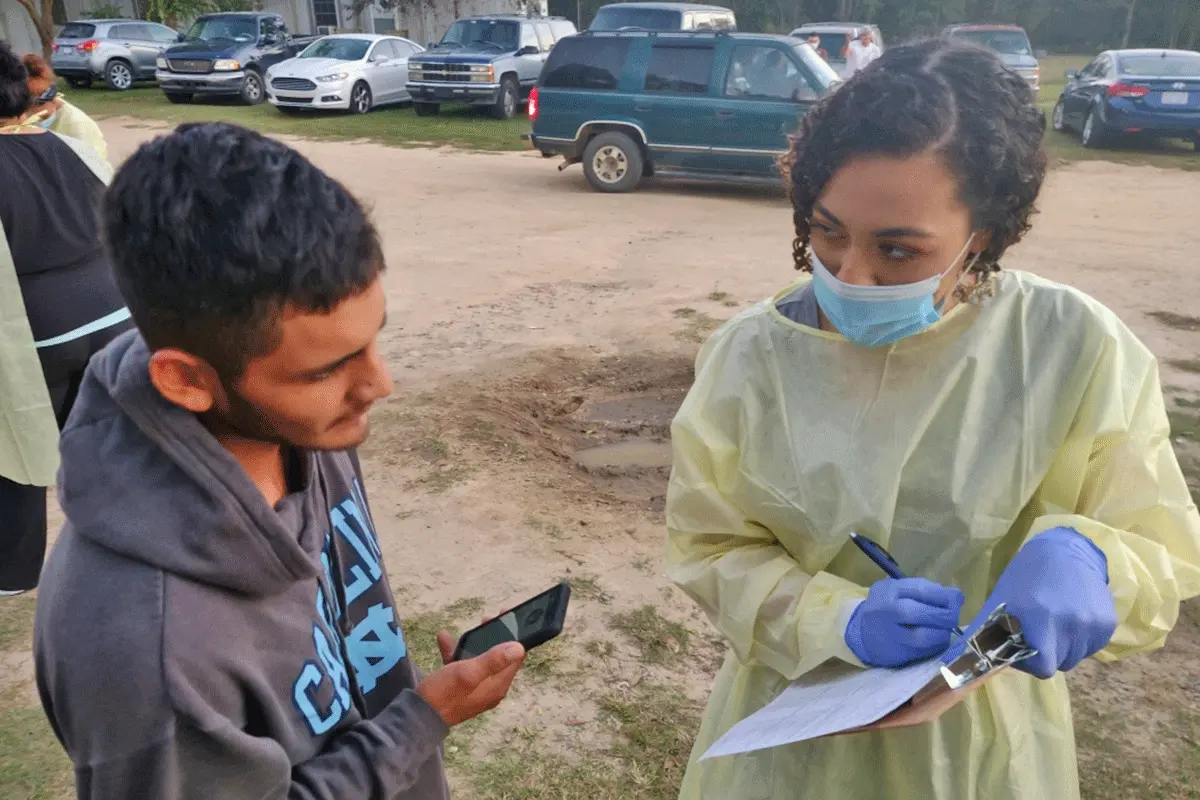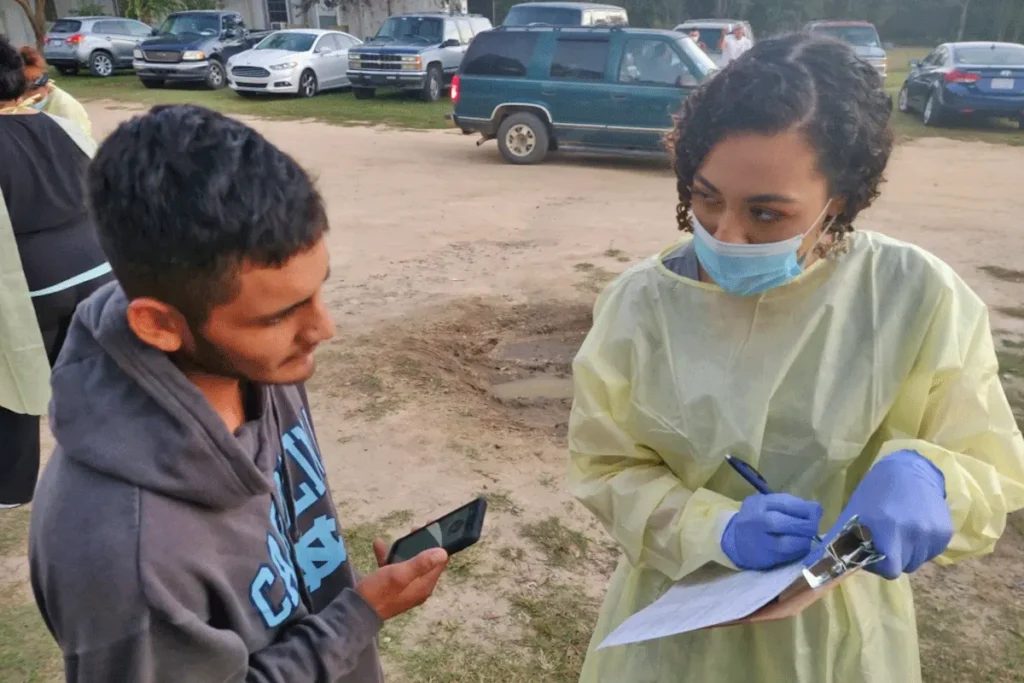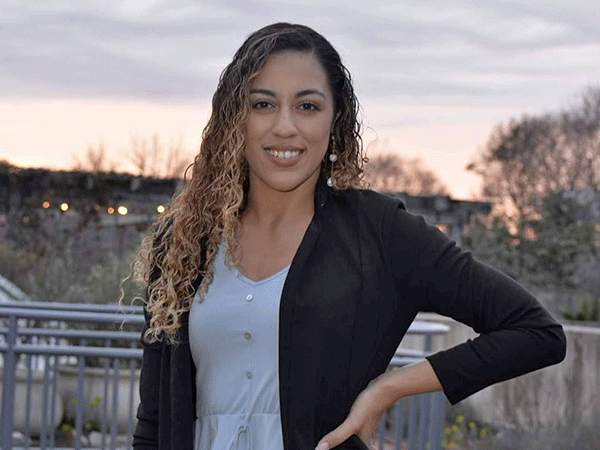Yesenia Cuello: Protecting The Rights Of Farmworkers

Yesenia Cuello discusses her organization’s COVID-19 response and the challenges farmworkers in North Carolina continue to face.
Posted on Aug 30, 2022

Originally from California, Yesenia Cuello moved to North Carolina with her family when she was five years old. As a child, she and her sisters joined their mother in the tobacco fields, harvesting leaves for up to 12 hours a day in the summer heat. This experience inspired her to speak up about the realities of working in the field.
Yesenia began fighting for agricultural worker protections as a teen when she joined Poder Juvenil Campesino, a youth group that empowers young adults to advocate for immigration reform and fair labor laws. Her time as an organizer took her from the state capital to the nation’s capital, and, in 2019, Yesenia became the executive director of NC Field, a community-based organization that supports North Carolina’s farmworker community and a partner to PIH-US, the U.S. arm of Partners In Health focused on accompanying local leaders to build strong, community-led health systems. From directly providing services that educate, build power, and address immediate social determinants of health to empowering farmworkers to pursue educational and economic opportunities and raising awareness about the injustices behind the industrial agricultural system, NC FIELD is working to ensure that seasonal and migrant workers and their families are protected and have access to opportunities beyond the agricultural industry.
Under Yesenia’s leadership, NC FIELD has grown to seven employees, added workers from the farmworker community to support interpretation and outreach, and increased its foundational support. When COVID-19 hit, NC FIELD expanded its work, offering material support to agricultural communities and setting up testing and vaccination clinics where farmworkers live, buy food, and worship. Throughout the pandemic, PIH-US has supported NC FIELD through grant writing, professional development, and data management.
Below, we talk with Yesenia about NC Field’s COVID-19 response and the challenges farmworkers in North Carolina continue to face.
What inspired you to get involved in farmworker justice?
I was first introduced to the agriculture industry through my mom. Growing up, she worked on hog farms and then tobacco farms. One summer my sisters and I begged my mom to join her in the fields. Considering we had never worked a day in our lives, it took some convincing. She thought we would want to quit after one day––but we worked in the fields every summer for four years.
My sisters and I have always looked up to our mom. She is a single parent, passionate about those around her, and extremely independent. In our eyes, our mom was who we aspired to be. Her activist nature and the experiences of my community led me to speak up about the issues that farmworkers face.\
Can you share more about NC Field’s efforts to empower the farmworker community?
In Eastern North Carolina, where NC Field is based, there are many large tobacco farms and crops such as sweet potatoes, cucumbers, and watermelon. These farms run almost entirely on the labor of farmworkers. We consider seasonal farmworkers among the most vulnerable and poverty-stricken of all farmworkers. They are a priority population for NC FIELD. Farmworkers are often exploited and suffer from malnutrition and food scarcity due to poor wages, lack of work, transportation difficulties, and rural isolation.
Empowerment is only possible when basic needs are met. At NC Field we are addressing the social barriers that keep farmworkers and their families from thriving: access to food, clothing, and health care. Not only do we go into the community and listen to the needs of workers, but we also have agricultural workers coming to us asking to volunteer and attend trainings and connecting us to vulnerable farmworkers and families that they know of.
How has your work pivoted throughout COVID-19?
NC Field is a direct reflection of the community that we serve. We listen to what the community tells us they need and adapt our work from there. To address barriers that prevented agricultural workers from getting tested or vaccinated, we set up clinics outside of typical working hours. We also went door-to-door delivering education in vulnerable communities—often in the dark, rain, and cold. These one-on-one conversations were especially important to improve vaccination rates. We found that many communities were not using reliable sources of information about vaccines, so we had to do a lot of education around the benefits of vaccination. Stepping in to support the COVID-19 response sidelined NC Field’s capacity-building plans, including occupational health training and English and cultural education for the agricultural workforce, as well as our youth programming. Despite this unexpected shift, we would not have been able to accomplish all that we did without the help of the seasonal and migrant workforce. They were invaluable in helping us locate spaces for testing and vaccines, as well as helping us identify trusted messengers for community outreach.
What are the biggest challenges facing NC Field and the farmworker community as we enter year three of the pandemic?
For NC Field, it is financial sustainability. We are now providing all types of services that farmworkers have come to rely on––from vaccines and health care, to access to food and clothing. It has been hard to look beyond COVID-19, beyond a temporary response team. We want to be able to establish long-term infrastructure and provide job security for our staff.
For the farmworker community, transportation and access to health care remain big issues. We are working with partners to expand the days and hours that health centers are open, as well as the services they provide. Having health education, news, and other critical information accessible in a variety of languages is also important. Many parents rely on their children to translate. It is unrealistic to expect children to accurately process and relay the type of information they are being called upon to support with. And honestly, it’s just not fair.
How can we continue to build power in the agricultural worker community?
We need to keep the focus on vulnerable groups at the state and federal levels so that we don’t return to the period of anonymity and invisibility that farmworkers had before the pandemic.
Because of the partnerships we have built over the last few years, NC Field is sitting at tables where, historically, we’ve never been. In many of these conversations, I am the only person who is a current or former farmworker. This isn’t enough. We need to push for adequate representation at these tables. After all, who better to share the realities of issues impacting the agricultural workers than the communities themselves?
My hope is that generations of child farmer workers and their families have the same opportunities that I had.
What makes you hopeful about the future?
Education, information, and advancement opportunities all give me hope. We’ve lost so much in my community. So many of us can’t legally drive to work, but we are harvesting this nation’s food supply; we struggle to access doctors and surgeries. Some of us are guest workers and live in housing that can’t be reached by first responders. There is a lot wrong. Despite all of this, I see smiles and helping hands at every food distribution event, at every clinic, and as people are picked up and dropped off at appointments or at the grocery store. I see hope. We are given hugs and thanked for the medicine we delivered, the donated mattresses, and the driver’s license manuals we printed off in Spanish. We have learned to endure as resources arrive that teach us how to navigate languages, culture, and systems. I am hopeful because my community is strong, and we will persevere until we are truly equal—and then we will thrive.
Originally published on pih.org




